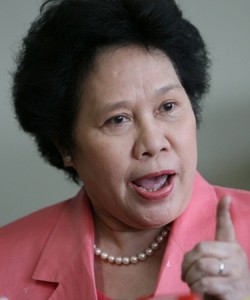MANILA, Philippines—The only thing the Philippines can do in case of an environmental, health and agricultural devastation in the face of North Korean threats to fire nuclear missiles at the United States and Pyongyang’s neighbors is draft a risk management strategy, according to Sen. Miriam Defensor-Santiago.
The country still has no crisis-prevention capability, according to Santiago. It could only make plans to cope with the disaster that might come from the worst-case scenario of an exchange of nuclear fire between North Korea and its main target, the US, she said.
“Since the Philippines is a non-nuclear state or player, we cannot do anything to prevent a crisis or an escalation of any crisis. (Doing so) is too far out and not within our capabilities,” said the senator, a member of the Senate foreign relations committee.
“What we should be concerned is about the management of the risk that comes with an explosion within our area,” she told reporters after delivering a speech at the graduation ceremonies of Our Lady of Fatima University on Tuesday.
According to Santiago, nuclear weapons could “produce blast effects and release a fireball of extremely high temperature” that could degrade the environment for decades.
Residual radiation could also result in massive cases of leukemia, congenital defects and mental retardation, she said.
Meanwhile, a nuclear winter could create dust clouds absorbing the sunlight, dropping temperatures damaging agricultural lands across the country, Santiago said.
According to Santiago, an expert on international law, the situation in North Korea boils down to only two possibilities—either North Korean dictator Kim Jong-un’s threat to bomb the US is a bluff to puff up his domestic image, or the youthful leader is serious about his plan but immature in his thoughts.
“We do not understand the lexicon of a totalitarian government because we are used to a democracy and what our leaders say at face value. In (Kim’s) case, he always speaks in a certain code and you have to be familiar with the history of North Korean totalitarianism to decipher the messages he is sending,” Santiago said.
Kim comes from a direct line of dictators that rules a supposedly communist North Korea. His grandfather, Kim Il-sung, set the stage for the family’s dynastic rule. The current leader’s father, Kim Jong-il, anointed him as successor from among his three sons before his death in December 2011.
Santiago said the incumbent Kim, who took over the reins of North Korea as a young man believed to be in his late 20s, “has had no length of experience in running a government and even more particularly in running the military.”
“The first question is, does he control the military or does the military control him? And the second obvious question is, is he blustering or is he talking for real? We don’t understand this because we have never dealt with someone like this,” the senator noted.
She said North Korea’s people have been living in “a very closed, hermetic society. And they are not in the habit of speaking their minds so I think it would be safe to act on the presumption that [Kim] is just trumping up his rhetoric.”
